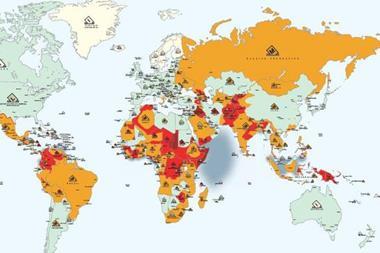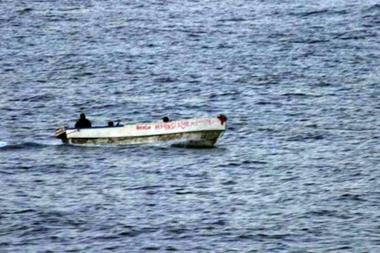Resource shortages and the impact of the financial crisis are likely to be the big risks in 2009, says Control Risks
Next year looks like its going to be a tough one for a good few reasons. Learning to live within the planet’s means is an ongoing challenge, but one that needs to be tackled sooner rather than later. The economic downturn is another major problem likely to bring with it some serious obstacles for business in 2009.
The impact of the financial crisis, scarcity of resources and political risks are all likely to weigh heavily on risk manager’s minds over the next 12 months, according to Control Risks' 2009 Risk Map.
Scarcity
Decades of economic growth and development have stretched the world to its limits. Scarcity of resources, including food, water, minerals and energy, will bring some major challenges in 2009, said the risk map. Although the analysis also suggested that some manifestations of this scarcity, such as high commodity prices, would recede in the short term because of the financial crisis.
Coping with these problems will require a variety of responses from the government and private sector. Cooperation is important to achieve any long lasting success but this could be hindered by efforts to seize control of assets as a means of gaining competitive advantage.
The consultants doubted whether ‘resource wars’ would manifest themselves in the year ahead, but reckoned that demand for limited resources would figure highly in international and domestic politics.
Financial crisis
The early hope that the developing world might be saved the harshest effects of the economic downturn and that this could limit its global impact has proved unrealistic. The economic slowdown is likely to affect all corners of the world. This adds up to a more precarious business environment which may lead many to become risk averse.
‘With asset prices collapsing, credit in short supply and conflicts smouldering in several regions, many investors view 2009 as a year to retrench and regroup,’ said the risk map.
But the consultants were convinced the crisis would reveal opportunities as well. These prospects could include ‘mergers and acquisitions, market entry and operational partnerships’.
“Obama should resist his party's urge to revert to economic protectionism, for the sake of long term economic prospects.
‘Rather than punishing investors generally, 2009 will reward those companies poised to capitalise on effective risk management and seize good deals,’ read the world risks report.
Impact of the US election
At the end of January, Barack Obama will be sworn in as the 44th President of the United States. His biggest challenge looks to be living up to the high expectations that have accompanied his popular rise to power.
To begin with, the new regime’s primary focus is unlikely to be anything but coping with the economic downturn. ‘[Obama’s] priority will be to restore confidence in the financial system and put in place a new regulatory architecture to address the shortcomings that fostered the current crisis.’
If the economy does not start to improve by the second half of 2009, Control Risks reasoned that Obama would have to resist his party’s urge to revert to economic protectionism, for the sake of long term economic prospects.
On foreign policy, the consultants said that the new president’s popularity would go a long way towards helping to restore America’s image in the world and rebuilding battered alliances.
Kidnap
Another headline issue businesses will have to face in the future is the risk of kidnapping and ransom. Workers who are sent overseas have always been at risk in certain parts of the world, for a long time mainly in the Latin American countries, but the threat of kidnap has become an altogether more global phenomenon, said the consultants. Afghanistan, Iraq and the Gulf of Aden, where the number and boldness of piracy attacks surged in 2008, are other hotspots.
While many kidnaps are ideologically motivated and linked with terrorism, ‘increasingly groups with a political or other agenda use kidnapping as a fund-raising tool’.
Kidnapping, a global phenomenon:
Top ten kidnapping-for-ransom countries:
1. Pakistan
2. Mexico
3. Venezuela
4. Nigeria
5. India
6. Afghanistan
7. Colombia
8. Somalia
9. Brazil
10. Philippines
(January - November 2008. This list is based on the total number of incidents about which Control Risks has been able to obtain reliable information.)

















